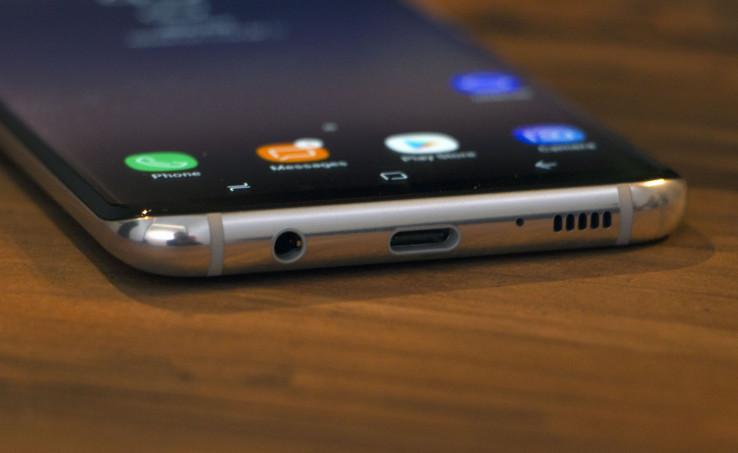

The Galaxy S8’s main selling point still isn’t fully formed. Announced the week leading up to today’s main event, Bixby is as much a key building block for the company moving forward as it is a shiny new piece of a flagship phone. The company is finally ready to make its play for the smart home, and the new messenger is going to be a key component.
Consider this: The company hasn’t been nearly as aggressive in its bid to provide a unifying presence for connected-home devices. Sure, the company picked up SmartThings back in 2014, but the Kickstarter-funded company hasn’t promoted the technology with the same push as Amazon’s Echo or Apple’s HomeKit, even as interest in the technology has skyrocket.
Strange, given the fact that it has the pieces to make a uniquely appealing play in a sea of like-minded solutions. After all, Samsung’s got something that Apple, Google and Amazon don’t: its own line of connected-home devices, from smart fridges to robotic vacuums.
This week at Unpacked, the company is showcasing some key steps toward unification. In discussing the unveiling, the company has made mention of its “overall ecosystem strategy,” tied together through Bixby Home. The assistant will provide a centralized location akin to Apple Home, wherein users can control and monitor connected devices and set automated multiple smart home behaviors based on things like user proximity or time of day, similar to what Apple offers with Scenes.
It’s clear, of course, that the Galaxy S8 is just the first step in Bixby’s growth. It likely won’t be long before the assistant rolls out to the rest of the company’s myriad device categories, starting with the a new router that was also announced at today’s event. Samsung’s growing home router play (which includes a number of 5G devices unveiled at MWC), is one speaker and integrated smart assistant away from taking on Echo and Google Home. Don’t be surprised if the company launches one of these devices by year’s end.
Even if Samsung for some reason fails to make good on that promise, the company again has plenty of devices in the wild to lean on. Apple has already made it clear that the Apple TV is going to be a centerpiece of the company’s connected-home strategy. In lieu of a low-priced Echo-like device, the set-top box is the closest the company has to an always-on connect product that can serve as a smart-home hub.
Samsung, for its part, has already announced that it’s going all-in on connected sets, giving all sets some level of smartness, moving forward. That’s a tremendous potential install base for the company. Pair that with all of the company’s connected washers and driers, refrigerators and the like, and we’re talking a large population of users who may have already opted into the company’s larger smart-home play without knowing it.
It’s for this reason Samsung’s decision to build its own Smart Assistant makes perfect sense. Sure, on mobile Bixby feels like another me-too play as Siri and Alexa are already battling it out for Android users, but Samsung’s move is much larger, and like Amazon’s low-cost Echo, the company has been laying the groundwork all along.
That means that, while Bixby is late to the party, adoption should be simple for anyone with a Galaxy device and connected Samsung home product. The company has been laying the groundwork for a larger product ecosystem, and if things go according to plan, the company’s new home assistant will be the thing that connects those dots.
Of course, Bixby has to actually make it out into the world. And like Google’s Assistant, the platform’s success will depend in part on how many mobile devices it makes it on to. It was Google’s somewhat delayed roll out that helped open the door for Amazon’s Alexa play on mobile. The S8 and S8+ will launch with the virtual assistant, and certainly the next Note device and any flagship tablets from the company.
But in order to make Bixby the ubiquitous language the company is hoping for, it’s going to have to extend beyond even Samsung devices. The company will need to bring its assistant to the Google Play — and dare I say it — Apple App stores. One of the key problems these assistants are working to solve is the creation of a unified, cross-device hub, rather than separate logins for each individual smart-home component.
As such, the company will need to ensure that Bixby is integrated with as many devices as possible. The company’s stated third-party support for apps will be a big piece of that puzzle, but opening up the assistant to more mobile platforms will be a solid way to help loop people in to the assistant and overcome the company’s late start to the party.
Still, the company will, at the very least, have a unique entry into the ever-escalating fight for the smart home. Like Apple, Amazon and Google, the company has found its own way into the space. And in some respects, Samsung may actually have the strongest potential foundation for a killer smart-home play, between Smart Things and a wide range of connected home appliances.
Bixby might be hampered by a late arrival out of the gate, but if the company plays its cards right and delivers some truly seamless integration across devices, it may have hope for uniting the smart home after all.

